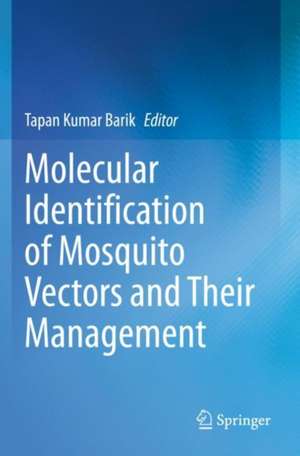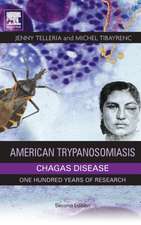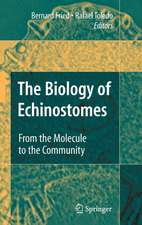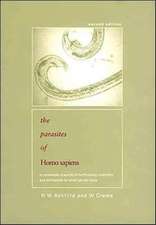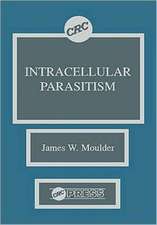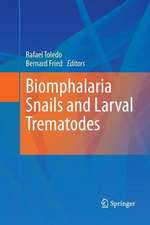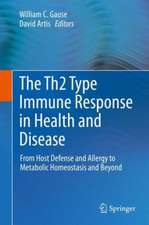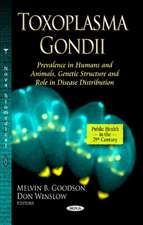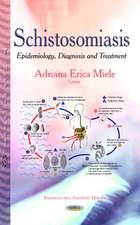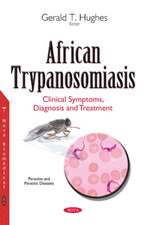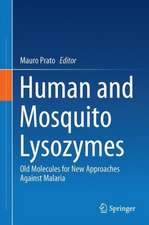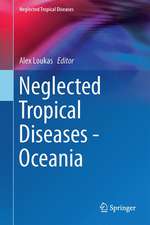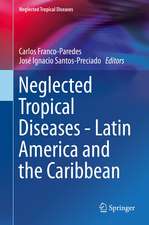Molecular Identification of Mosquito Vectors and Their Management
Editat de Tapan Kumar Bariken Limba Engleză Paperback – 2 feb 2022
The book describes various molecular taxonomic methods, including DNA barcoding and single nucleotide polymorphism-based machine learning approach, which are used for the identification of mosquito vectors.
It also presents the various mosquito control methods, namely, phytochemicals, Bacillus thuringiensis toxins, nanotechnology, biological control agents, and environmental management strategies. It also highlights the importance of various repellents that are used for protection from different kinds of mosquito vectors.
Finally, the book offers a comprehensive yet representative description of challenges associated with mosquito vector-borne diseases. The book is a useful resource for medical entomologists, health workers, and researchers working in mosquito-control and vector-borne diseases.
| Toate formatele și edițiile | Preț | Express |
|---|---|---|
| Paperback (1) | 1154.22 lei 6-8 săpt. | |
| Springer Nature Singapore – 2 feb 2022 | 1154.22 lei 6-8 săpt. | |
| Hardback (1) | 1161.21 lei 6-8 săpt. | |
| Springer Nature Singapore – feb 2021 | 1161.21 lei 6-8 săpt. |
Preț: 1154.22 lei
Preț vechi: 1214.98 lei
-5% Nou
Puncte Express: 1731
Preț estimativ în valută:
220.89€ • 229.76$ • 182.36£
220.89€ • 229.76$ • 182.36£
Carte tipărită la comandă
Livrare economică 14-28 aprilie
Preluare comenzi: 021 569.72.76
Specificații
ISBN-13: 9789811594588
ISBN-10: 9811594589
Ilustrații: XI, 225 p. 26 illus., 5 illus. in color.
Dimensiuni: 155 x 235 mm
Greutate: 0.34 kg
Ediția:1st ed. 2020
Editura: Springer Nature Singapore
Colecția Springer
Locul publicării:Singapore, Singapore
ISBN-10: 9811594589
Ilustrații: XI, 225 p. 26 illus., 5 illus. in color.
Dimensiuni: 155 x 235 mm
Greutate: 0.34 kg
Ediția:1st ed. 2020
Editura: Springer Nature Singapore
Colecția Springer
Locul publicării:Singapore, Singapore
Cuprins
Chapter 1. Unravelling Mosquito Species Complex through DNA barcodes: Complementing Morphological Identification for Accurate Discrimination.- Chapter 2. From Linnaean system to Machine learning based-SNP Barcoding: A changing epitome of mosquito species Identification.- Chapter 3. Chemical methods for control of Mosquito vectors.- Chapter 4. Use of Phytochemicals: A promising and eco-friendly approach for the management of mosquito vector populations.- Chapter 5. Toxins of Bacillus thuringiensis: A novel microbial insecticide for mosquito vector control.- Chapter 6. Biocontrol of mosquito Vectors: A new dimension to prevent mosquito borne diseases.- Chapter 7. Environmental management and sustainable control of mosquito vector : challenges and opportunities.- Chapter 8. Mosquito Repellent: A Novel Approach for Human Protection.- Chapter 9. Nano-biotechnology: A new window for management of mosquito vectors.- Chapter 10. Application of radiation for the management of mosquito vectors.-
Notă biografică
Dr. Tapan Kumar Barik is working as an Assistant Professor in the Post Graduate Department of Zoology, Berhampur University, India. He has received Ph.D. from the Center for advance study in Zoology, University of Delhi, New Delhi, India. Previously, he has worked as a Project Coordinator at the National Institute of Malaria Research, an ICMR Institute to coordinate the research activities of World Bank-funded projects on mosquito biology. He was awarded Raman post-doctoral research fellowship by the University Grants Commission (UGC), Govt. of India.His research interests are focused on Entomology, Molecular Biology, Radiation Biology and Nanotechnology. He has contributed 13 book chapters in the national and international books and published 42 research/review papers in National and International journals of high repute. He is an editorial board member of several scientific journals, namely Advances of Entomology, Discourse Journals, Immunology and infectious diseases etc. He is a member of many international and national scientific societies and organizations, importantly, American Nanosociety and National Academy of Vector-Borne Diseases, India.
Textul de pe ultima copertă
This book summarizes the recent advancements in identifying the mosquito vectors and discusses various strategies for their control.
The book describes various molecular taxonomic methods, including DNA barcoding and single nucleotide polymorphism-based machine learning approach, which are used for the identification of mosquito vectors.
It also presents the various mosquito control methods, namely, phytochemicals, Bacillus thuringiensis toxins, nanotechnology, biological control agents, and environmental management strategies. It also highlights the importance of various repellents that are used for protection from different kinds of mosquito vectors. Finally, the book offers a comprehensive yet representative description of challenges associated with mosquito vector-borne diseases. The book is a useful resource for medical entomologists, health workers, and researchers working in mosquito-control and vector-borne diseases.
The book describes various molecular taxonomic methods, including DNA barcoding and single nucleotide polymorphism-based machine learning approach, which are used for the identification of mosquito vectors.
It also presents the various mosquito control methods, namely, phytochemicals, Bacillus thuringiensis toxins, nanotechnology, biological control agents, and environmental management strategies. It also highlights the importance of various repellents that are used for protection from different kinds of mosquito vectors. Finally, the book offers a comprehensive yet representative description of challenges associated with mosquito vector-borne diseases. The book is a useful resource for medical entomologists, health workers, and researchers working in mosquito-control and vector-borne diseases.
Caracteristici
Highlights various methods to identify mosquito vectors of public health importance
Discusses effective strategies for mosquito control including biocontrol’s and nanotechnology
Elucidates the use of microbial agents and phytochemicals as insecticides for the management of mosquito vectors
Emphasizes the advent of nanotechnology in the field of mosquito biology and their management
Discusses effective strategies for mosquito control including biocontrol’s and nanotechnology
Elucidates the use of microbial agents and phytochemicals as insecticides for the management of mosquito vectors
Emphasizes the advent of nanotechnology in the field of mosquito biology and their management
